The Complete Guide to Adaptogenic Herbs for Stress Without Prescriptions
Are you tired of the side effects, dependency risks, and costs of prescription anxiety medications? You're not alone. Over 40 million Americans struggle with stress and anxiety, and many are seeking natural alternatives that work with their body rather than against it.
This comprehensive guide explores adaptogenic herbs for stress—powerful plant medicines used for thousands of years that offer a natural path to resilience without the risks associated with benzodiazepines, SSRIs, or other prescription medications.
Why People Are Choosing Adaptogenic Herbs Over Prescriptions
The prescription medication landscape for stress and anxiety comes with significant concerns that drive many people toward natural alternatives:
- Dependency and Withdrawal: Benzodiazepines like Xanax and Ativan can create physical dependence in as little as 2-4 weeks, with withdrawal symptoms that can be severe and prolonged
- Side Effects: SSRIs commonly cause weight gain, sexual dysfunction, emotional blunting, and insomnia—issues that can persist long-term
- Cost Burden: Prescription anxiety medications can cost $100-$500 monthly without insurance, plus ongoing doctor visits
- Delayed Results: Most prescription antidepressants take 4-6 weeks to show effects, while managing unpleasant startup side effects
- Limited Root Cause Treatment: Prescriptions manage symptoms but rarely address the underlying physiological stress response
Adaptogenic herbs offer a fundamentally different approach. Rather than suppressing symptoms or altering neurotransmitter levels artificially, adaptogens work by normalizing your body's stress response system, supporting adrenal function, and building long-term resilience.
What Makes Adaptogenic Herbs Different: The Science of Natural Stress Relief
Adaptogens aren't just "calming herbs"—they're a specific category of plants with unique pharmacological properties. To be classified as an adaptogen, an herb must meet three criteria:
- Non-specific action: They increase resistance to a wide range of stressors (physical, chemical, and biological)
- Normalizing effect: They help maintain homeostasis by balancing body systems
- Non-toxic: They're safe for long-term use with minimal side effects
The key mechanism behind adaptogens involves the hypothalamic-pituitary-adrenal (HPA) axis—your body's central stress response system. When you experience chronic stress, your HPA axis can become dysregulated, leading to elevated cortisol, inflammation, fatigue, and anxiety. Adaptogens help modulate this system, preventing both overactivation and underactivation.
Scientific Evidence: A 2020 systematic review published in Pharmaceuticals examined 64 studies on adaptogens and found significant evidence for their stress-reducing effects, with improvements in cortisol levels, anxiety scores, and mental performance—without the side effects associated with pharmaceutical interventions.
For a deeper understanding of how adaptogens work at the cellular level, read our detailed article: Adaptogenic Herbs Demystified: Science, Safety & Daily Protocols.
The 7 Most Powerful Adaptogenic Herbs for Stress Relief
Not all adaptogens work the same way. Some are energizing, others calming, and some provide balanced support. Here's your complete guide to the most effective adaptogens for anxiety and stress management:
Ashwagandha Root Best for Anxiety
Withania somnifera
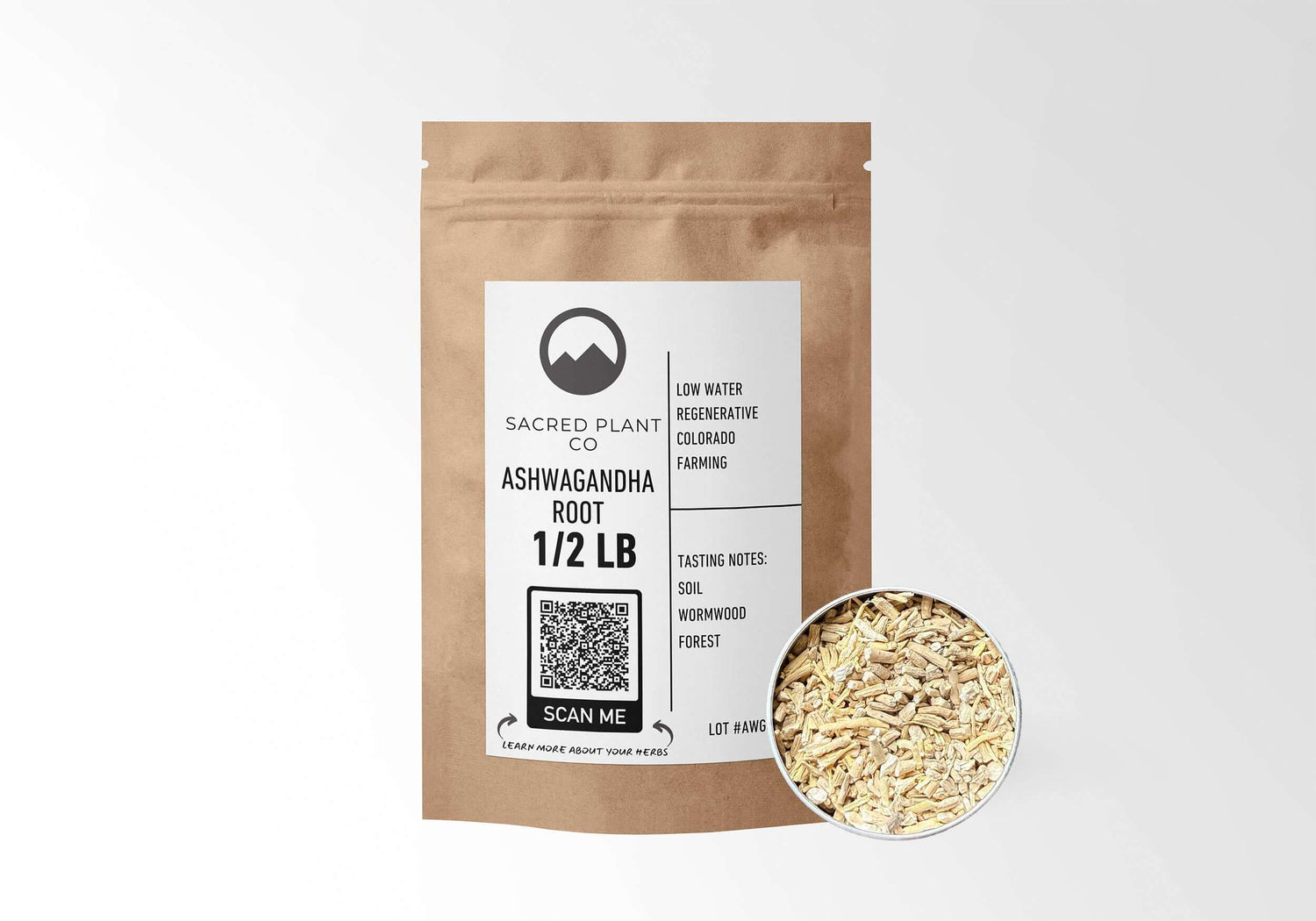
Why it's the #1 adaptogen for stress: Ashwagandha has more clinical research for anxiety than any other adaptogen. Multiple randomized controlled trials show it significantly reduces cortisol levels and anxiety symptoms, with effects comparable to prescription anti-anxiety medications—but without the side effects.
Primary Benefits:
- Reduces cortisol by up to 30% (clinically proven)
- Decreases anxiety scores by 44-56% in 8-week studies
- Improves sleep quality and reduces insomnia
- Supports thyroid function and energy levels
- Reduces stress-related food cravings
Best For: Generalized anxiety, stress-related insomnia, cortisol dysregulation, worry and rumination
Typical Dosage: 300-600mg of standardized extract (5% withanolides) twice daily, or 3-6 grams of root powder daily
When to Take: Best taken with meals. For anxiety, split dose between morning and evening. For sleep issues, take larger dose 1-2 hours before bed.
Shop Premium Ashwagandha Root →Compare with other adaptogens: Ashwagandha vs Holy Basil: Which Reigns Supreme?
Holy Basil (Tulsi) Best for Anxious Thoughts
Ocimum sanctum
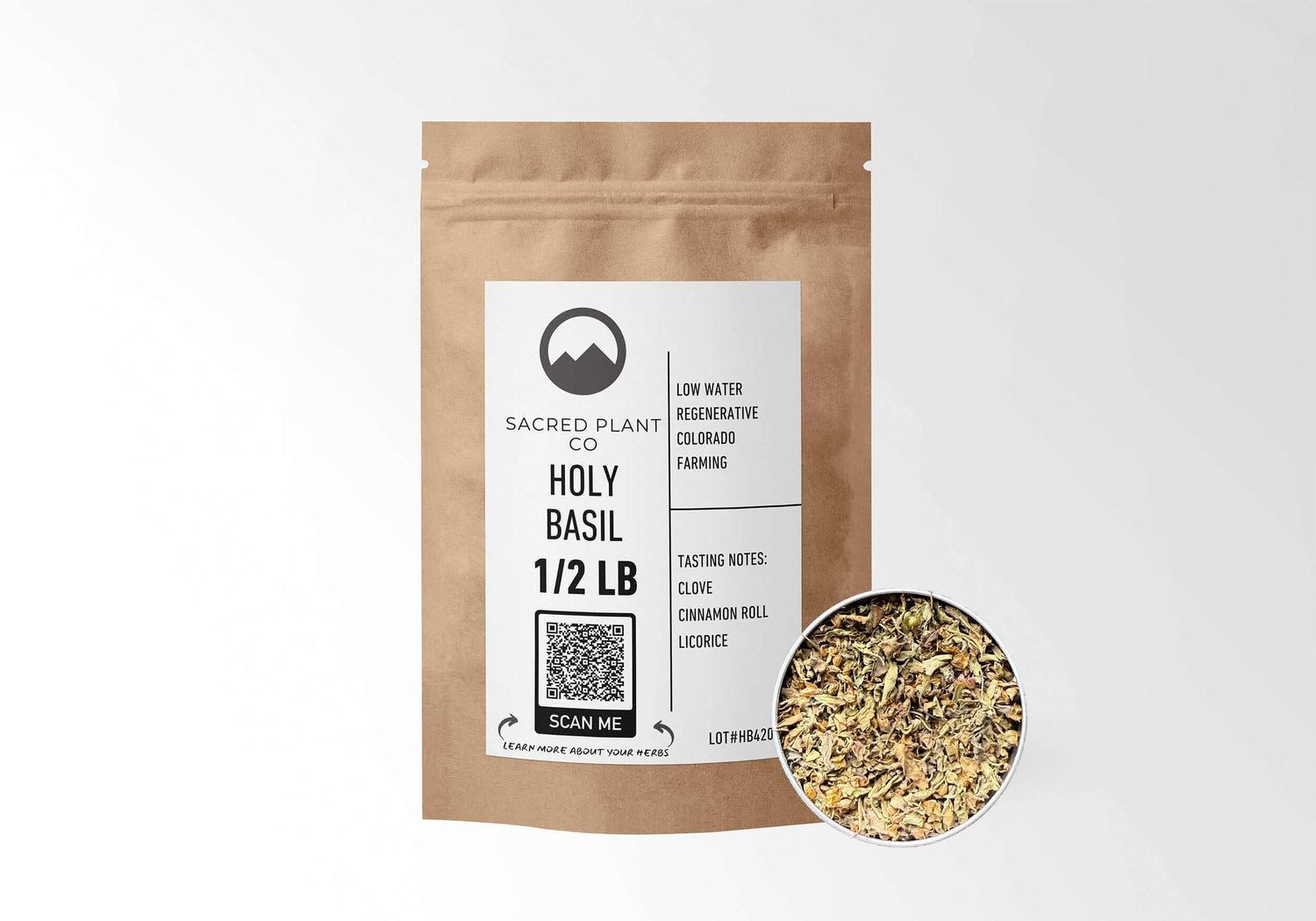
Why it's essential for mental clarity: While ashwagandha calms the body's stress response, holy basil specifically targets the mental and emotional aspects of anxiety. It's been used in Ayurvedic medicine for over 3,000 years as a "rasayana"—an herb that promotes longevity and clarity of mind.
Primary Benefits:
- Reduces anxious thoughts and mental restlessness
- Improves focus and cognitive function under stress
- Supports healthy cortisol metabolism
- Mild mood-lifting properties
- Protects against stress-induced memory impairment
Best For: Racing thoughts, worry, stress-induced brain fog, situational anxiety, overwhelm
Typical Dosage: 300-600mg standardized extract daily, or 2-3 cups of tulsi tea
When to Take: Morning and early afternoon for mental clarity. Can be taken as a calming tea in the evening (despite mild stimulating properties, it promotes restful relaxation).
Shop Adaptogenic Tulsi Tea →Learn the perfect brewing method: How to Brew Tulsi Tea for Maximum Benefits
Reishi Mushroom Best for Sleep & Calm
Ganoderma lucidum

Why it's called the "mushroom of immortality": Reishi has been revered in Traditional Chinese Medicine for over 2,000 years as a supreme immune and longevity tonic. For stress, its unique triterpenes and polysaccharides calm the nervous system while building deep resilience.
Primary Benefits:
- Promotes deep, restorative sleep without grogginess
- Calms overactive immune response (stress-induced inflammation)
- Reduces stress-related heart palpitations
- Supports liver detoxification (important for hormone balance)
- Natural antihistamine properties (stress often worsens allergies)
Best For: Stress-induced insomnia, "tired but wired" feeling, immune system support, inflammatory conditions worsened by stress
Typical Dosage: 1-3 grams of mushroom powder daily, or 500-1500mg extract
When to Take: Evening is ideal (1-2 hours before bed). Can be taken throughout the day for immune support.
Shop Premium Reishi Mushroom →Compare immune-supporting adaptogens: Reishi vs Astragalus for Immune Support
Siberian Ginseng (Eleuthero) Best for Fatigue
Eleutherococcus senticosus
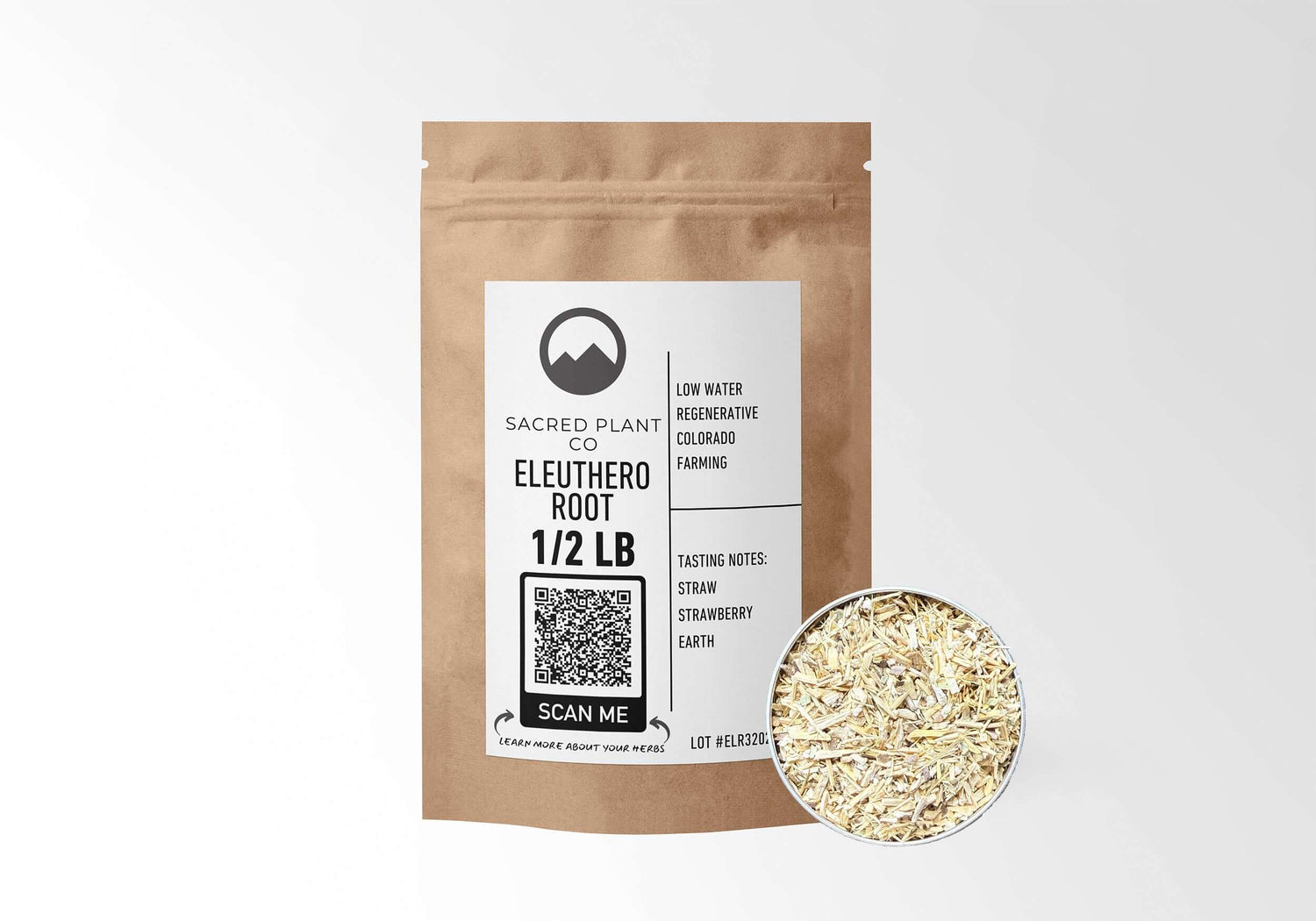
Why it's perfect for stress-induced exhaustion: Unlike true ginsengs, Siberian ginseng (eleuthero) is specifically indicated for people experiencing chronic stress with fatigue, burnout, and reduced stamina. Soviet researchers studied it extensively for athletic and mental performance enhancement.
Primary Benefits:
- Increases mental and physical stamina during stress
- Supports adrenal recovery from chronic stress
- Improves stress resilience and adaptability
- Enhances immune function (reduces stress-related illness)
- Supports healthy energy without overstimulation
Best For: Burnout, chronic fatigue, adrenal exhaustion, stress-related immune weakness, recovery from prolonged stress
Typical Dosage: 2-3 grams of dried root daily, or 300-400mg standardized extract
When to Take: Morning and early afternoon. Avoid evening doses as it can be mildly stimulating.
Shop Bulk Siberian Ginseng →American Ginseng Best for Calm Energy
Panax quinquefolius
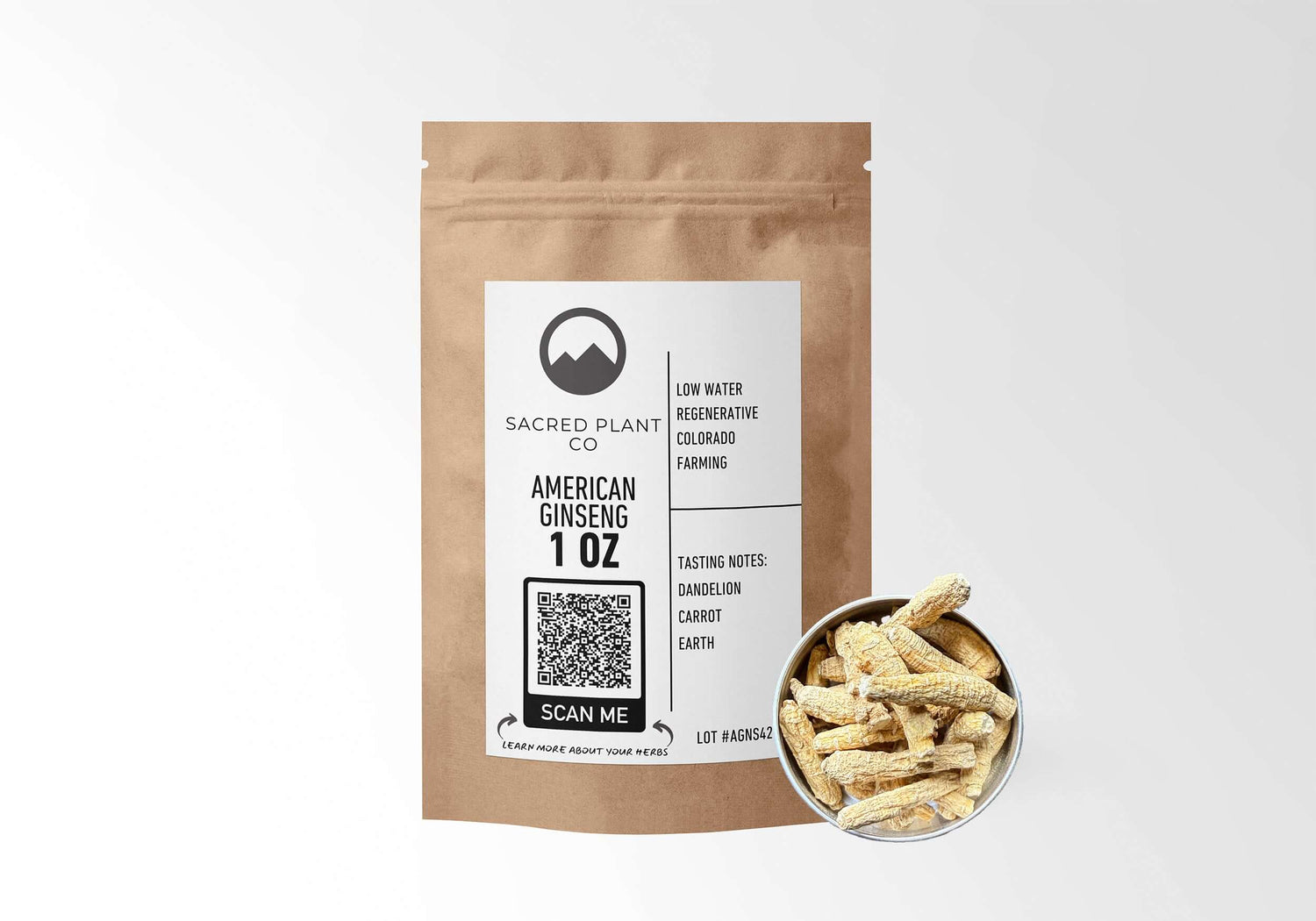
Why it's superior for anxious energy: While Asian ginseng (Panax ginseng) can be too stimulating for anxiety-prone individuals, American ginseng provides gentle, sustained energy while actively calming the nervous system. It's considered "cooling" in Traditional Chinese Medicine—perfect for stress that manifests as agitation.
Primary Benefits:
- Provides energy without increasing anxiety or jitters
- Improves mental performance and focus during stress
- Supports blood sugar balance (stress affects glucose)
- Reduces stress-related digestive issues
- Enhances emotional balance and stress tolerance
Best For: Anxiety with fatigue, stress-related blood sugar swings, mental fatigue, burnout prevention, high-stress careers
Typical Dosage: 1-2 grams of dried root daily, or 200-400mg extract
When to Take: Morning or early afternoon. Can be taken before stressful events or presentations.
Shop 6-Year American Ginseng Root →Licorice Root Best for HPA Support
Glycyrrhiza glabra
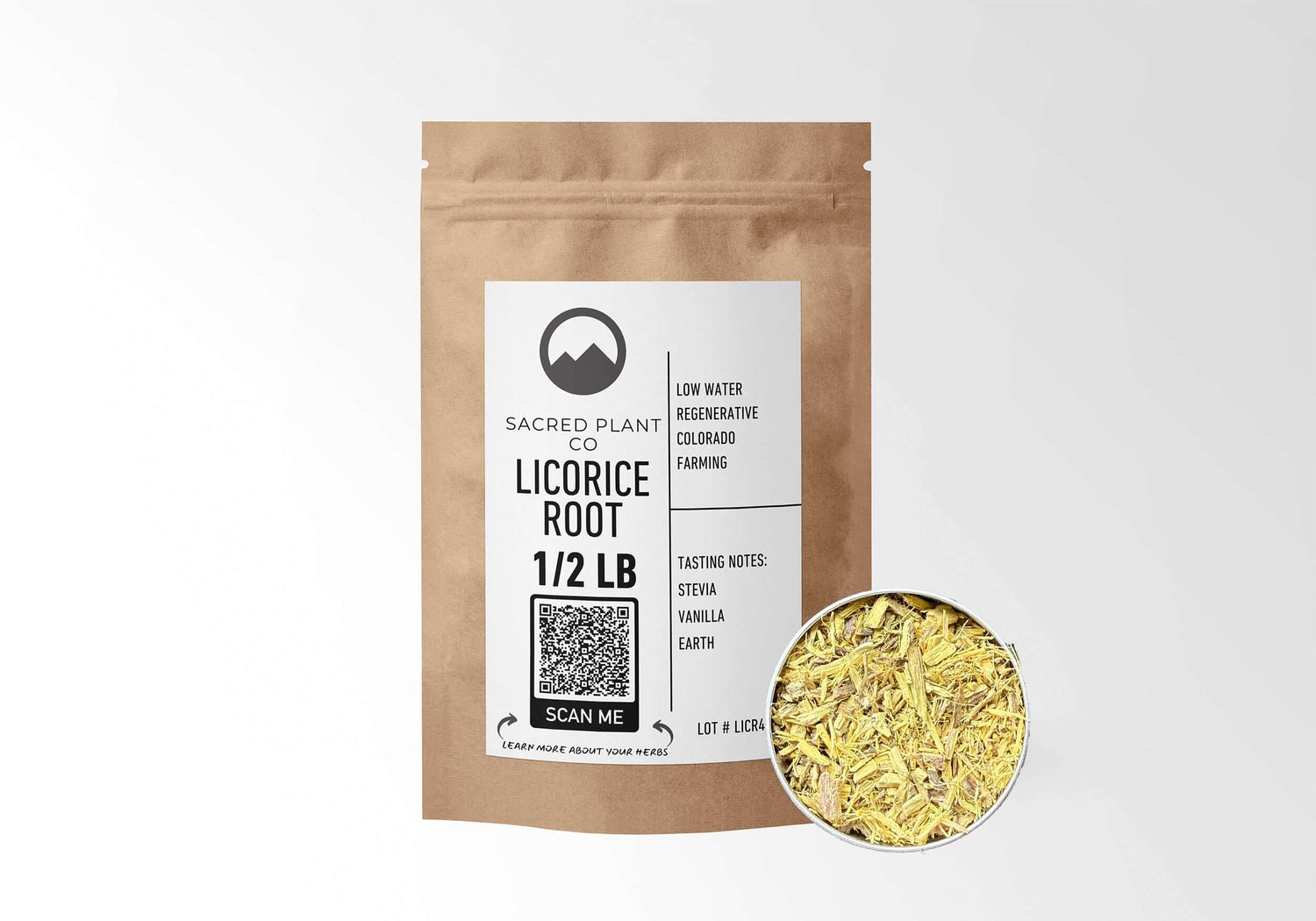
Why it's essential for adrenal support: Licorice root is unique among adaptogens because it directly supports cortisol metabolism. It contains glycyrrhizin, which slows the breakdown of cortisol, making it particularly valuable for people with low cortisol from chronic stress (adrenal fatigue).
Primary Benefits:
- Supports healthy cortisol levels (especially morning cortisol)
- Helps recover from adrenal exhaustion
- Reduces stress-related digestive inflammation
- Supports respiratory health (stress affects breathing)
- Enhances the effects of other adaptogens (synergist)
Best For: Chronic stress with fatigue, low morning energy, stress-related digestive issues, hormonal imbalances, formulas with other adaptogens
Typical Dosage: 1-2 grams of dried root daily (in tea or decoction)
When to Take: Morning is best to support natural cortisol rhythm. Use in formulas with other adaptogens.
Important Caution: Licorice can raise blood pressure and should not be used long-term (>6 weeks) or by those with hypertension, kidney disease, or heart conditions. Pregnant women should avoid it. Consider DGL (deglycyrrhizinated licorice) for long-term use.
Cordyceps Mushroom Best for Physical Stress
Cordyceps militaris/sinensis
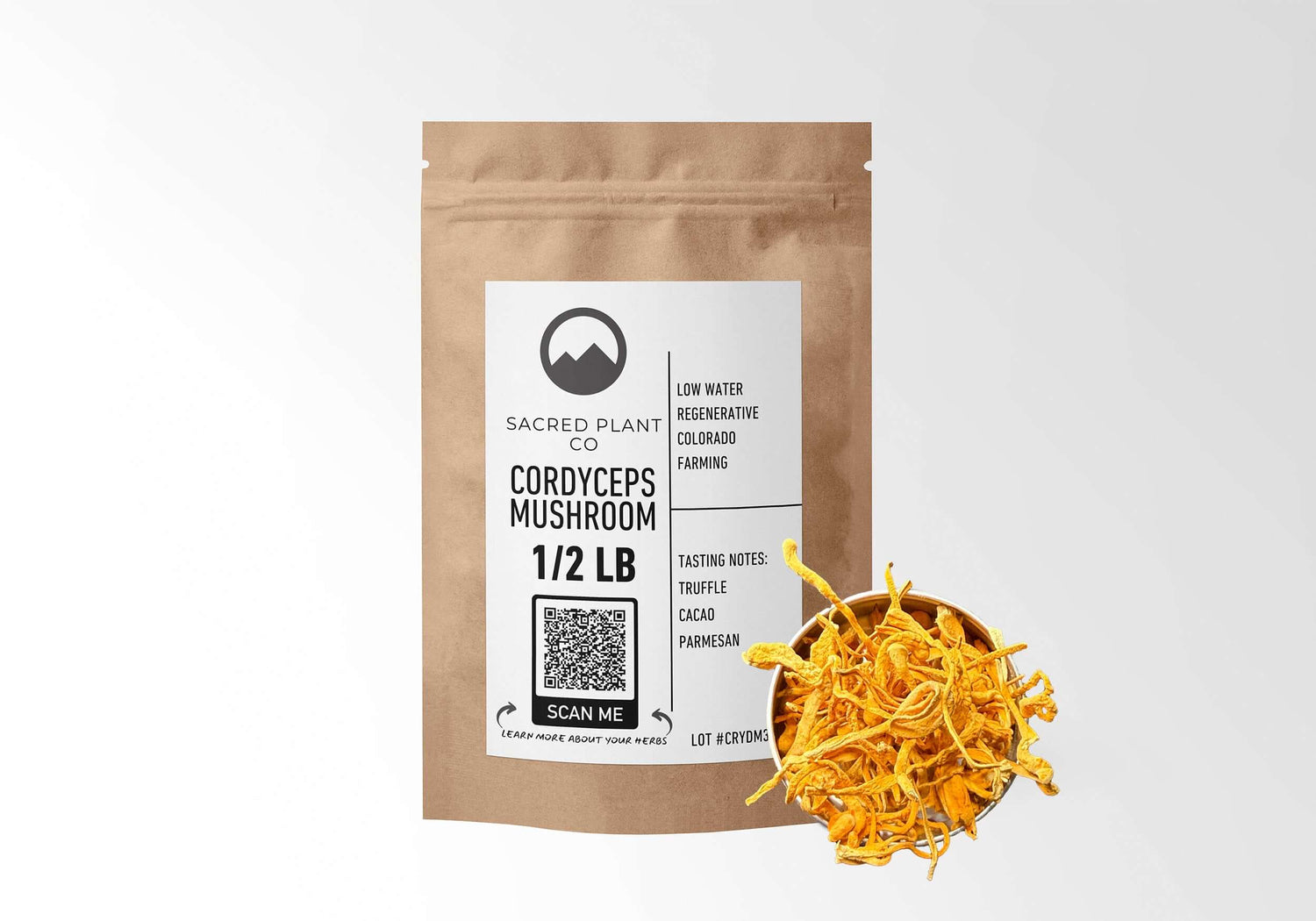
Why athletes love it for stress: Cordyceps is the adaptogen of choice when stress manifests physically—as muscle tension, exercise intolerance, or respiratory issues. It enhances cellular energy production (ATP) while calming the stress response.
Primary Benefits:
- Improves physical performance and recovery under stress
- Enhances oxygen utilization (reduces shallow breathing from anxiety)
- Supports healthy libido (often affected by chronic stress)
- Increases cellular energy without stimulating cortisol
- Supports kidney and lung function (stress affects both)
Best For: Physical manifestations of stress, exercise recovery, stress-related sexual dysfunction, athletic performance under pressure, respiratory stress
Typical Dosage: 1-3 grams of mushroom powder daily, or 500-1000mg extract
When to Take: Morning or before exercise. Can be split throughout the day.
Shop Premium Cordyceps Mushroom →Adaptogens vs. Prescription Medications: A Direct Comparison
| Factor | Adaptogenic Herbs | Prescription Medications |
|---|---|---|
| Mechanism of Action | Normalize HPA axis, support natural stress response, build resilience over time | Alter neurotransmitter levels, suppress symptoms, work quickly but don't address root cause |
| Time to Effect | Subtle effects in 1-2 weeks, full benefits in 4-8 weeks (building effect) | Some immediate (benzos), others 4-6 weeks (SSRIs) |
| Side Effects | Minimal; mild digestive upset possible initially. Safe for long-term use | Common and often significant: weight gain, sexual dysfunction, dependency, emotional blunting |
| Dependency Risk | None; can be stopped without withdrawal | High for benzos, moderate for SSRIs; tapering often required |
| Cost (Monthly) | $20-$60 for quality herbs | $100-$500+ without insurance, plus doctor visits |
| Additional Benefits | Immune support, anti-inflammatory, energy, cognitive enhancement, hormonal balance | Typically single-purpose; no additional health benefits |
| Long-term Use | Safe and often beneficial for months to years | Tolerance can develop; long-term effects uncertain |
Important Note: This comparison is for educational purposes. Adaptogenic herbs are not FDA-approved treatments for anxiety disorders. If you're currently on prescription medications, never discontinue them without medical supervision. Adaptogens can be used alongside prescriptions (with doctor approval) or as a first-line approach for mild to moderate stress.
How to Build Your Adaptogen Protocol (Step-by-Step)
Creating an effective adaptogen routine requires understanding your specific stress pattern and choosing herbs accordingly. Here's how to design a personalized protocol:
Step 1: Identify Your Stress Type
Wired and Anxious: High cortisol, racing thoughts, difficulty relaxing, insomnia
Start with: Ashwagandha + Holy Basil + Reishi
Tired and Stressed: Fatigue despite stress, burnout, low motivation, weakened immunity
Start with: Siberian Ginseng + American Ginseng + Licorice Root (short-term)
Tired But Wired: Exhausted but can't sleep, anxious energy, feeling "fried"
Start with: Ashwagandha + Cordyceps (morning) + Reishi (evening)
Emotional and Overwhelmed: Mood swings, irritability, crying easily, feeling defeated
Start with: Holy Basil + Ashwagandha + American Ginseng
Step 2: Start Low and Build Gradually
Week 1-2: Single Adaptogen Foundation
Begin with ONE primary adaptogen at 50% of the target dose. This allows you to observe how your body responds and identify any sensitivities.
Example: If starting with ashwagandha (target: 600mg daily), begin with 300mg for two weeks.
Week 3-4: Increase to Full Dose
If you tolerate the adaptogen well, increase to the full recommended dose. Continue for 2-4 weeks to assess effectiveness.
Week 5+: Add Complementary Adaptogens
Once your primary adaptogen is established, add 1-2 complementary herbs that address other aspects of your stress pattern. Add one at a time, waiting a week between additions.
Step 3: Timing Matters
Morning Protocol (7-9 AM):
- Energizing adaptogens: Siberian Ginseng, American Ginseng, Cordyceps
- Supportive dose of Ashwagandha or Holy Basil
- Licorice Root (if using for adrenal support)
Afternoon Protocol (2-4 PM):
- Second dose of Holy Basil (for mental clarity)
- Light snack with adaptogens to prevent afternoon crash
Evening Protocol (7-9 PM):
- Calming adaptogens: Ashwagandha, Reishi
- Tulsi tea as a relaxing evening ritual
- Take 1-2 hours before bed for best sleep support
Step 4: Track Your Progress
Adaptogens work subtly and cumulatively. Keep a simple log tracking:
- Sleep quality (1-10 scale)
- Energy levels throughout the day
- Stress response to triggers
- Mental clarity and focus
- Physical tension or pain
- Mood and emotional regulation
Expect to see initial changes in 1-2 weeks, with optimal benefits emerging at 4-8 weeks of consistent use.
Step 5: Cycle Your Adaptogens
While adaptogens are safe for long-term use, many herbalists recommend cycling protocols every 2-3 months to prevent tolerance and maintain effectiveness:
- 2-3 Months On: Use your adaptogen protocol consistently
- 1-2 Weeks Off: Take a break or switch to different adaptogens
- Rotate: Change your formula seasonally or based on changing stress patterns
Combining Adaptogens: Synergistic Formulas That Work
While single adaptogens are effective, combining them strategically creates powerful synergistic effects. Here are evidence-based formulas for specific needs:
The Anxiety Relief Formula
Morning: 300mg Ashwagandha + 300mg Holy Basil
Evening: 300mg Ashwagandha + 1g Reishi
Why it works: Ashwagandha targets cortisol and physical anxiety, Holy Basil addresses mental restlessness, and Reishi promotes deep sleep—covering all anxiety manifestations.
The Burnout Recovery Formula
Morning: 2g Siberian Ginseng + 1g Licorice Root + 500mg Cordyceps
Afternoon: 1g American Ginseng
Evening: 300mg Ashwagandha
Why it works: Directly supports adrenal recovery, boosts cellular energy, provides sustained calm energy, and promotes restorative sleep.
Duration: Use for 4-6 weeks, then transition to maintenance protocol
The Executive Performance Formula
Morning: 400mg American Ginseng + 300mg Holy Basil + 500mg Cordyceps
Before Stressful Events: Extra 200mg American Ginseng
Evening: 300mg Ashwagandha + Tulsi Tea
Why it works: Enhances mental clarity and decision-making under pressure while maintaining calm energy and preventing stress accumulation.
Safety, Contraindications, and When to See a Doctor
While adaptogenic herbs are remarkably safe, responsible use requires understanding important precautions:
General Safety Guidelines
- Pregnancy and Breastfeeding: Most adaptogens should be avoided during pregnancy. Consult with a qualified herbalist or naturopathic doctor.
- Autoimmune Conditions: Some adaptogens (especially Siberian Ginseng) may stimulate immune function, which could theoretically exacerbate autoimmune conditions. Work with a practitioner.
- Hormone-Sensitive Conditions: Adaptogens can influence hormone balance. Those with estrogen-sensitive conditions should consult a healthcare provider.
- Surgery: Discontinue adaptogens 2 weeks before scheduled surgery as some may affect blood clotting or anesthesia.
- Medication Interactions: Adaptogens can interact with blood thinners, diabetes medications, immunosuppressants, and sedatives. Always check with your pharmacist or doctor.
Specific Adaptogen Cautions
Ashwagandha: Avoid with hyperthyroidism. Can cause drowsiness; don't operate heavy machinery initially. May lower blood sugar—monitor if diabetic.
Licorice Root: Can raise blood pressure and lower potassium. Maximum 6 weeks of use. Avoid with hypertension, kidney disease, or heart conditions.
American/Siberian Ginseng: May be too stimulating for some. Start with low doses. Avoid with high blood pressure until cleared by a doctor.
Reishi: Mild blood-thinning effects. Use caution if on anticoagulants. Rare allergic reactions possible.
When Natural Stress Relief Isn't Enough
Adaptogenic herbs are powerful allies, but they're not appropriate for every situation. Seek professional help if you experience:
- Panic attacks or severe anxiety that interferes with daily function
- Suicidal thoughts or self-harm ideation
- Anxiety that persists despite 8+ weeks of adaptogen use and lifestyle changes
- Symptoms of major depression (persistent sadness, loss of interest, significant weight changes)
- Trauma-related symptoms (flashbacks, nightmares, dissociation)
- Substance use to cope with stress
- Significant decline in work, school, or relationship functioning
Adaptogens work best as part of a comprehensive approach that includes therapy, lifestyle modifications, and—when necessary—appropriate medical treatment. They're an excellent first-line or complementary approach, not a replacement for necessary psychiatric care.
Beyond Adaptogens: The Complete Natural Stress Management Toolkit
Adaptogenic herbs work synergistically with other natural approaches. For optimal stress resilience, consider integrating:
1. Nervous System Regulation
- Vagal Toning: Deep breathing, cold exposure, humming/singing activates the parasympathetic nervous system
- Somatic Practices: Yoga, tai chi, qigong help release stored stress from the body
- Nature Exposure: 20 minutes daily in nature significantly reduces cortisol
2. Nutritional Support
- Magnesium: 300-500mg daily (critical for stress response; most people are deficient)
- B-Complex: Supports adrenal function and energy production
- Omega-3 Fatty Acids: Reduces inflammation and supports brain health
- L-Theanine: Promotes calm alertness (synergistic with adaptogens)
3. Sleep Optimization
- Consistent sleep schedule (even on weekends)
- Dark, cool bedroom (65-68°F optimal)
- No screens 1 hour before bed
- Evening wind-down ritual with adaptogens
4. Movement Medicine
- Aerobic Exercise: 30 minutes, 5x/week reduces anxiety as effectively as SSRIs
- Resistance Training: Builds confidence and reduces stress hormones
- Restorative Movement: Gentle stretching, walking, swimming for high-stress days
Bottom Line: Your Path to Stress Freedom Without Prescriptions
Adaptogenic herbs offer a scientifically-validated, safe, and effective alternative to prescription medications for stress and anxiety management. Unlike pharmaceuticals that suppress symptoms and create dependency, adaptogens work with your body's natural wisdom—normalizing stress responses, building resilience, and addressing root causes.
Getting started is simple:
- Identify your primary stress pattern (wired vs. tired vs. both)
- Choose 1-2 adaptogens that match your needs
- Start with moderate doses and build gradually
- Give it 4-8 weeks for full effects to emerge
- Combine with lifestyle fundamentals for optimal results
For most people struggling with mild to moderate stress and anxiety, a well-designed adaptogen protocol can provide meaningful relief without the side effects, costs, and risks of prescription medications.
Your journey to natural stress resilience starts with a single herb. Choose yours today.
Resources and Further Reading
Sacred Plant Co. Adaptogen Articles:
- Adaptogenic Herbs Demystified: Science, Safety & Daily Protocols — Deep dive into adaptogen mechanisms and safety
- Ashwagandha vs Holy Basil: Which Reigns Supreme? — Detailed comparison of the two top stress adaptogens
- How to Brew Tulsi Tea for Maximum Benefits — Optimize your holy basil practice
- Reishi vs Astragalus for Immune Support — Immune-modulating adaptogens compared
Ready to Begin Your Adaptogen Journey?
Explore our complete collection of sustainably sourced, premium-quality adaptogenic herbs and medicinal mushrooms.
Shop All AdaptogensMedical Disclaimer: This article is for educational purposes only and is not intended as medical advice. Adaptogenic herbs are not FDA-approved for treating, curing, or preventing any disease. Always consult with a qualified healthcare provider before starting any new supplement regimen, especially if you have pre-existing health conditions, are pregnant or breastfeeding, or are taking medications. If you are currently on prescription medications for anxiety or depression, do not discontinue them without medical supervision.
Frequently Asked Questions
Can adaptogenic herbs really replace prescription anxiety medications?
For some people with mild to moderate stress and anxiety, adaptogens can provide meaningful relief and better day-to-day coping without the side effects or dependency risk of prescriptions. However, they are not a direct replacement for medications in severe anxiety, major depression, bipolar disorder, or trauma-related conditions. If you’re already on prescriptions or have a diagnosed mental health condition, work with your prescriber before changing anything.
How long does it take for adaptogenic herbs to start working?
Most people notice subtle shifts in 1–2 weeks: slightly better sleep, fewer spikes of anxiety, or more even energy. The deeper “nervous system rewiring” tends to show up over 4–8 weeks of consistent use. Adaptogens are more like training your stress response than flipping a switch, so consistency matters more than intensity.
Is it safe to take more than one adaptogen at the same time?
Yes. Many traditional formulas combine multiple adaptogens to target different aspects of the stress response. A common pattern is one primary adaptogen (like ashwagandha or reishi) supported by 1–2 complementary herbs. The key is to start low, add slowly, and change only one thing at a time so you can tell what’s helping and how your body responds.
Can I use adaptogens if I’m already taking prescription medication?
Sometimes, yes—but this should always be done with professional guidance. Adaptogens can interact with blood pressure medications, blood thinners, thyroid meds, immunosuppressants, diabetes medications, and psychiatric drugs. Bring a list of any herbs you’re considering to your doctor, pharmacist, or a qualified herbal practitioner so they can check for interactions and adjust doses if needed.
Are adaptogenic herbs safe for long-term daily use?
For most healthy adults, many adaptogens are appropriate for long-term use, especially when cycled or rotated a few times per year. There are important exceptions: licorice root should be limited to short-term use in people with normal blood pressure, and several adaptogens are not recommended in pregnancy, breastfeeding, or specific medical conditions. When in doubt, work with a practitioner who understands both herbs and your medical history.
Do adaptogens work if my stress is mostly mental and emotional, not physical?
Yes. Adaptogens influence the HPA axis and nervous system, which sit upstream of both physical and emotional stress responses. Some herbs, like holy basil and ashwagandha, are especially suited for racing thoughts, worry, and emotional overload, while others, like cordyceps or Siberian ginseng, lean more toward physical stamina and recovery. Matching the herb to your personal stress pattern is where the real magic happens.
What’s the best way to get started if I’ve never used adaptogens before?
Begin with one primary adaptogen that matches your main concern—ashwagandha for anxiety and sleep, holy basil for busy thoughts, reishi for “tired but wired,” or Siberian ginseng for burnout. Start at half the typical dose for 1–2 weeks, then slowly build up if you tolerate it well. Once you understand how that herb feels in your body, you can layer in a second adaptogen or build a more complete protocol like the ones outlined in this guide.
Are adaptogens safe for teenagers or older adults?
Possibly, but this is not a one-size-fits-all situation. Teenagers, older adults, and anyone on multiple medications should get personalized guidance. Lower body weight, changing hormones, and existing prescriptions all change how herbs behave. A practitioner experienced in herbal medicine can help choose appropriate herbs, doses, and timing.





